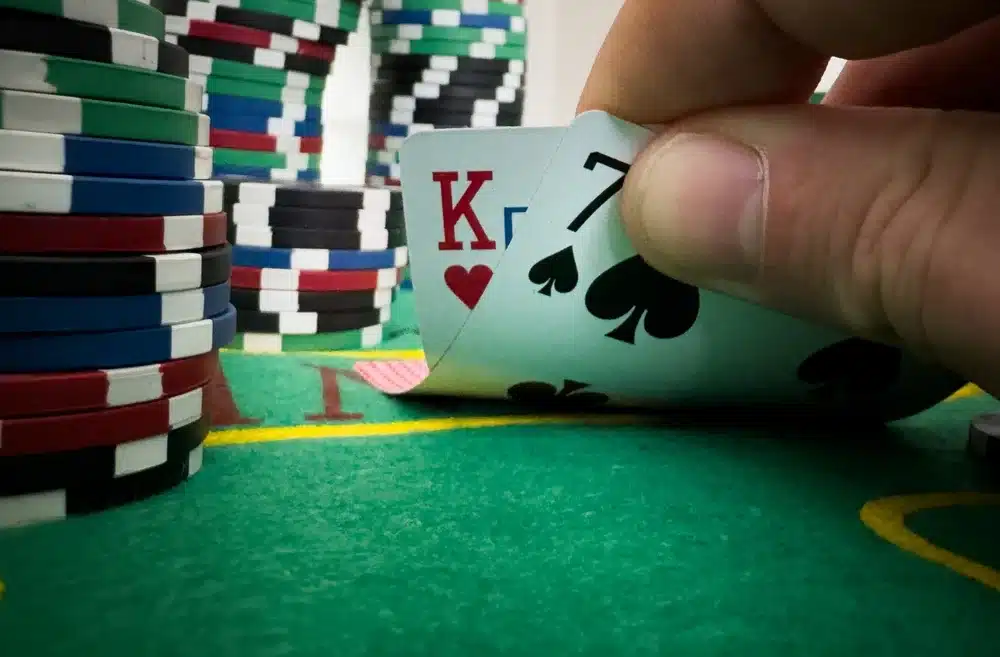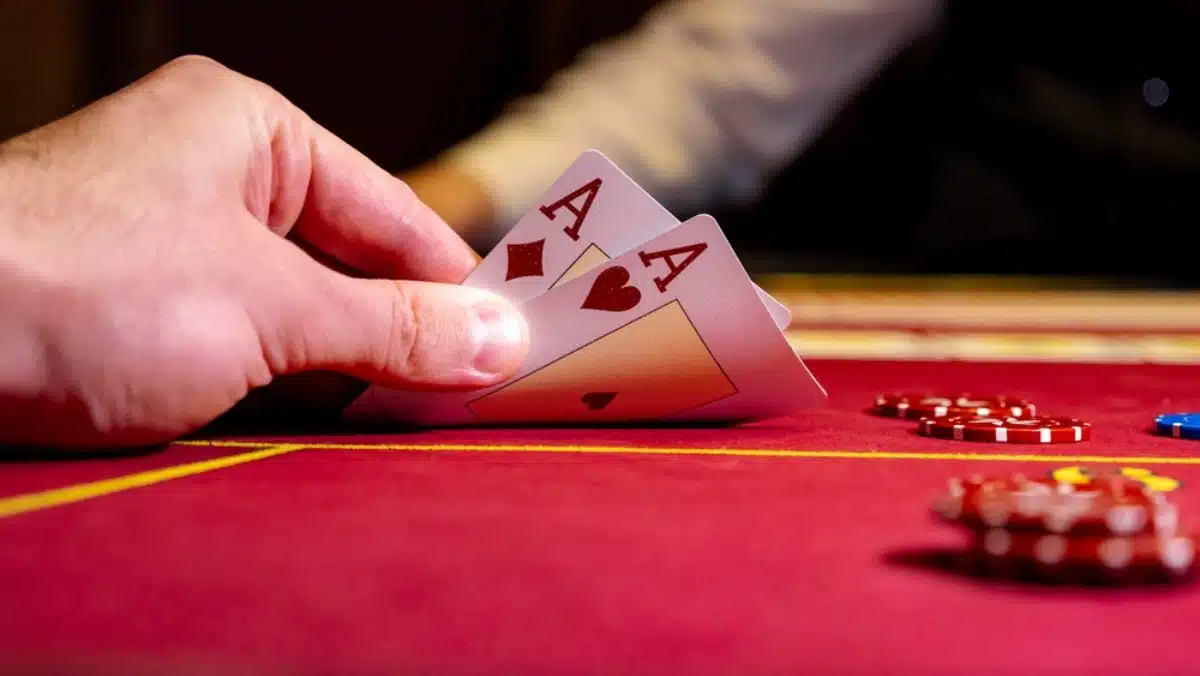Double Kokomo method: A smart roulette strategy to manage risk and win more Looking for a progressive roulette strategy with a bit more stability? The Double Kokomo method takes the classic Kokomo system and doubles our coverage by betting on two spots instead of one. This spreads your risk, smooths out losses, and slightly raises […]
Poker slow roll: Etiquette and consequences explained
Winning in poker can be exciting, but it’s important to respect the table. Poker is a social game, and all players share the responsibility to avoid actions that could ruin the experience for everyone else. One action that goes against this spirit is the poker slow roll—widely considered one of the most disliked moves in the game.
The gambling community has collectively agreed that nobody likes the slow roll act. While it may seem tempting to draw out a winning hand for dramatic effect, doing so undermines fairness and sportsmanship at the table. So why is the poker slow roll so controversial?
What is a slow roll in poker?
The poker slow roll is the act of delaying your actions when you already have a winning hand. For example, you already have the royal straight flush, but reveal it slowly for suspense. It is a rude performance, because it’s about gloating over your victory as a way to taunt an opponent.
Its name, ‘slow rolling’, is often mistaken for another poker term called ‘slow playing’. The main difference is that the latter is a legitimate poker strategy. Here’s a quick rundown of how they’re different:
| Slow rolling | Slow playing | |
| When does it happen? | At the end of the game. | Throughout the game. |
| How does it work? | The winner waits for others to reveal their hand before their own. | The player with a strong hand keeps a low-intensity bet by calling and checking. |
| What is the intention? | To add fanfare to one’s victory, like a suspenseful reveal. Most of the time, it’s just to gloat. | To avoid getting other players to fold and ensure more players keep adding to the pot. |
The slow roll act is something that is done at land casinos. It’s usually not possible at live casino games like on Live88 tables at Bitcasino, because of how certain actions are automated. However, it is still possible to delay a turn by not clicking the action prompt.
Examples of slow roll in poker
There is no exact description to answer ‘what is a slow roll?’. It is effectively an umbrella term for many ways to do it. Each slow roll example below shows how it’s done to help you better understand the action and why it’s considered ‘bad etiquette’:
- The plot twist: The game ends, requiring everyone to reveal their cards. One of the players purposefully paused so everyone else could reveal theirs and feel confident in the strength of their hands. The last player to reveal has the winning hand, and this action spoiled the other players’ early celebration.
- One at a time: The player with the winning hand keeps suspense high by only revealing their hand one card at a time. In the process, they haven’t outright declared that they won. By delaying the last card, the opponent is left with a lingering hope that it could be a bluff.
- Overplaying the act: Pretending you have a weak hand, such as using a poker check-raise, is a valid strategy, but it’s easy to overplay the act. It becomes a slow roll when other players have already gone all-in, and you’re still acting hesitant. In this case, the slow roll starts by delaying the call.
Every slow roll example is technically different, but serves the same purpose of delaying the reveal. Most of the time, people do this after they have allowed the opponent to celebrate. Doing so lets them relish the satisfaction of the other player’s disappointment when the opponent reveals their hands.
Is slow rolling considered bad etiquette?

Slow rolling isn’t illegal, and there is no formal rule against it. Poker players just have an understandably strong negative reaction towards it as a gesture. According to Jared Tendler, author of The Mental Game of Poker and a mental game coach, slow rolling is a strategy. The goal is to anger the opponent to get the edge purposefully.
Gamblers are often advised to take a break when they start getting frustrated, a common tip given to new players to avoid developing gaming habit problems. Playing while angry or frustrated can lead to erratic emotions, which can cause uncontrollable urges. This applies to more seasoned players, too, and professional poker players are especially vulnerable.
Poker tournaments end only when one player wins all the chips in play, leaving no room for a participant to leave to take a break. Getting tilted early can take a mental toll on the player, making them susceptible to bad decision-making for the rest of the game. Hence, slow rolling is accepted as a valuable strategy in a psychological game like poker.
That said, the slow roll act is still considered greatly disrespectful. Deliberately infuriating another player to gain an advantage is bad conduct in any social game. Mind games are useful in a competitive setting, but they don’t have a place on a casual table. Ensuring everyone is having fun playing together is proper poker etiquette.
How to handle slow rolls in poker
Slow rolls aren’t illegal, and most tables don’t have policies against them. So, anyone at the table can do it, much to everyone else’s dismay. Poker slow roll can come from anyone, even you.
Here’s what you need to know when facing the action as a poker player:
When you slow roll
If you ever think about slow rolling (it’s advised that you shouldn’t), then it helps to understand why. Just know that it provides almost no long-term advantage, and it hurts your relationship with other players at the table. Professional poker players rarely use it, and casinos frown upon it.
Slow rolling is not guaranteed to work
It is advantageous to get your opponent in a bad state of mind so they can make mistakes. However, it’s never guaranteed to work as intended. Some players may be angry at you for slow rolling them, yet it doesn’t affect their judgment. It may inspire them to slow roll later, and the revenge will be seen as poetic justice from the viewers’ perspective.
Affects everyone at the table, even if you target only one player
What ultimately makes slow rolling infamous is its effects on the rest of the table. The person doing it and the one facing it aren’t the only people at the table, as most games seat 3 to 6 players. Slow rolling breaks momentum, and it wastes everyone’s time. Reveal your cards when prompted by the dealer so everyone can move on to the next round.
There is never a good time to slow roll
Movies and television dramas involving a poker scene often show the main character slowly revealing their hand to someone disliked. This gives the impression that doing a slow roll against someone the table mutually dislikes would seem justified or entertaining. This is not the case. Remember that the action affects the pace for everyone, and starting a fight hurts the mood of the room.
Facing a slow roll
If you’re ever the one facing a slow roll, take a deep breath and stay in control. Remember that this is a deliberate tactic to make you angry, but there are ways to handle it. Here’s what you need to do if the slow roll is ever used against you:
Take a moment to self-reflect
Ask yourself how much the slow roll affects you. If you think rationally, doing it or not doesn’t change the outcome. The outcome was decided the moment the dealer called for a reveal, regardless of how players show their hands.
Focus on your mistake and learn from it
After realising exactly what bothers you about the slow roll, think of how you could handle that better. The main reason players are vulnerable to slow rolls is overconfidence. You fully expected yourself to be the winner, and the defeat abruptly ruins your moment.
Focus on the game ahead
What’s done is done, and let it go. You are right to feel angry at someone’s disrespectful actions, but you can’t let it affect your game. Acknowledge it and then focus on the game. Don’t give in to urges like slow rolling as revenge. You’re not the only one seated, and it will affect the rest of the table.
Tips to avoid bad manners in slow rolling

Keeping the spirit of fair play and encouraging interpersonal engagement at the table are the core principles of poker etiquette. Besides the obvious, like ‘don’t cheat’, ‘don’t act out of spite’, or ‘don’t be rude’, there are several unspoken rules to keep your experience pleasant. Here are tips to guide you in avoiding mistakes and maintaining a positive image in poker:
Respect everyone’s time
Slow rolling is frowned upon because it breaks momentum. Examples of which are frequently standing up to go to the toilet, engaging in conversation during the game, and taking too long to decide. It’s best to avoid these issues, especially as an adult.
Push your bet forward in one clear motion
You may see some players drop chips one at a time, or stack them slowly. This is considered rude, similar to slow rolling, because it deliberately wastes time. It’s always better to just prepare one stack of your bets and push them forward in one motion. It also makes your wager clear to everyone at the table.
Place bigger chips clearly and in front
Higher-value chips are usually placed in front of the stack if you have to push your bet as a big pile. This makes it easier for everyone at the table to see exactly how much you’re betting.
For example, if you’re betting $250, placing four $50 chips in front of a stack of five $10 chips makes it easier to see and count. Clarity keeps the game going, and everyone will know how much they need to wager on a call or raise.
Pay attention to your peers
It’s easy to get lost in thoughts when you’re trying to plan or calculate your chances of winning. This can lead you to space out and ignore other people without meaning to. Be attentive to your peers, because poker is a social game. Engaging in banter without losing track of your cards and bets is also seen as the basic level of poker etiquette.
Don’t hit and run
Hit and run is the act of leaving the table after a big win. It’s considered bad etiquette unless you really have to go. You should play a few more rounds, giving other players a chance to recover some of their losses. After several turns, if they don’t win, then you can leave. It’s also impressive if you manage to defend your bankroll, because it leaves an impression that you won due to skill, not just luck.
Never bring up ‘how you could have won’
There’s always one person saying ‘Oh, I could have won if I did this!’ at the end of the game. Others complain about not having a good hand for too many turns. In their defence, they may bring this up as a way to start a conversation, but it just comes off as petty.
From the winner’s perspective, this may be interpreted as downplaying someone’s victory, as if they didn’t deserve it. If you lose, your next action should be a compliment or congratulations.
Why good poker etiquette is important
Poker is not just about betting and winning money, but a social activity. Everyone’s at the table to have fun, and everyone is responsible for maintaining a positive vibe. Good etiquette is what keeps the game going, makes players feel welcome, and ensures fair play between individuals.
When etiquette is ignored, even one player can spoil the atmosphere. This can lead to conflict, mistrust, and unnecessary tension in the room. No one benefits from ignoring proper poker etiquette, but upholding it gives everyone the following benefits:
Smooth gameplay
Trust is central to keeping the flow of the game consistent, which is only possible if everyone follows proper poker etiquette. If the gameplay stays smooth, then rounds will be over quicker, and winners will be declared faster. Shorter games allow everyone to play more rounds, giving all players more chances to win the pot.
Mutual respect
Respect shows in the way you treat other players and the dealer. You may lose and feel disappointed in certain rounds, but there should be no spite between participants. Showing elegance, even in defeat, earns respect and encourages the same for others. Players who value respect will be invited to more games, while those known as bad company are not welcome.
Positive reputation
Everyone leaves an impression when they socialise, so you are responsible for how others perceive you. If you are someone people would like to befriend, they are less likely to act in ways that could upset you. Meanwhile, having a bad reputation can make you a target for spiteful plays, making your experience more difficult. Being friendly promotes peace of mind and fair play.
Improve your poker etiquette at Bitcasino
Practising proper poker etiquette matters online just as much as at live tables. At Bitcasino, you can try it on the mobile app or any supported browser. Act efficiently on your turn, make clear bets, and avoid needless delays. Fast and fair play keeps the game smooth and ensures that all players enjoy their time at the table.
Respect remains vital even in digital rooms. Treat other players and the dealers with courtesy, keep the chat polite, and focus on the hand in play. Following social norms and proper poker etiquette builds trust, protects your reputation, and keeps the game welcoming for all players.
Frequently Asked Questions (FAQs)
Here are some frequently asked questions about slow rolling in poker:
Is slow rolling allowed in poker?
Slow rolling is not against formal poker rules. It breaks social norms and most players view it as poor etiquette, but it’s not prohibited or punishable by rules.
Can a slow roll be accidental?
Yes, slow rolls can happen by mistake. Distraction, confusion about hand strength, or hesitation at showdown can cause these delays and look like slow rolling unintentionally.
How can I avoid accidentally slow rolling?
Stay focused during gameplay, act quickly when it’s your turn, and reveal your cards promptly. Awareness and quick action prevent misunderstandings.
Can slow rolling be used as a strategy?
Some claim it rattles rivals, yet most agree it offers almost no benefits. It risks tilt, creates tension, and opens opportunities that can backfire.
How to identify intentional slow rolls?
An intentional slow roll involves a clear pause when a player knows they hold the winning hand. Contextual clues from comments or gestures can also confirm the intent.
How to avoid slow rolls?
To avoid making slow rolls, be quick in revealing your hand when prompted. Stay focused on the game and maintain mutual respect with other players.
















